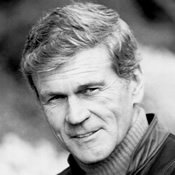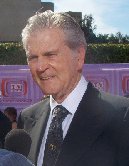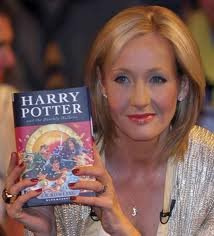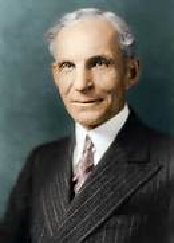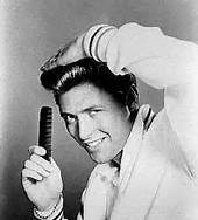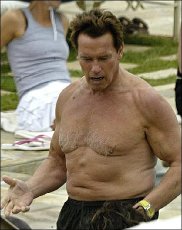
James Maitland "Jimmy" Stewart (May 20, 1908 – July 2, 1997) was an American actor. Known for his distinctive drawl and every man screen persona, Stewart's film career spanned 80 films from 1935 to 1991. With the strong morality he portrayed both on and off the screen, he epitomized the "American ideal" in the mid-twentieth century. In 1999, the American Film Institute (AFI) ranked him third on its list of the greatest American male actors. He received numerous honors including the Screen Actors Guild Life Achievement Award in 1968, the AFI Life Achievement Award in 1980, the Kennedy Center Honor in 1983, as well as the Academy Honorary Award and Presidential Medal of Freedom, both in 1985.
Born and raised in Indiana, Pennsylvania, Stewart started acting while at Princeton University. After graduating in 1932, he began a career as a stage actor, appearing on Broadway and in summer stock productions. He landed his first supporting role in The Murder Man (1935) and had his breakthrough in Frank Capra's ensemble comedy You Can't Take It with You (1938). The following year, Stewart garnered his first of five Academy Award nominations for his portrayal of an idealized senator in Capra's Mr. Smith Goes to Washington (1939). The following year he received the Academy Award for Best Actor, the only competitive Oscar of his career, for his performance in the George Cukor romantic comedy The Philadelphia Story (1940). Stewart's first postwar role was as George Bailey in Capra's It's a Wonderful Life (1946).
Although the film was not a major success upon release, he earned an Oscar nomination, and the film has become a Christmas classic, as well as one of his best-known roles. As one of the most popular film stars of the '50s, Stewart played darker, more morally ambiguous characters in movies directed by Anthony Mann, including Winchester '73 (1950), The Glenn Miller Story (1954), and The Naked Spur (1953), and by Alfred Hitchcock in Rope (1948), Rear Window (1954), The Man Who Knew Too Much (1956), and Vertigo (1958). During this time he received Academy Award nominations for his roles in the comedy Harvey (1950) and the courtroom drama Anatomy of a Murder (1959). Stewart also starred in The Greatest Show on Earth (1952), The Spirit of St. Louis (1957), The Flight of the Phoenix (1965) as well as the Western films How the West Was Won (1962), The Man Who Shot Liberty Valance (1962), and Cheyenne Autumn (1964). He appeared in many popular family comedies during the 1960s.
Stewart remained unmarried until his 40s and was dubbed "The Great American Bachelor" by the press. In 1949, he married former model Gloria Hatrick McLean. They had twin daughters, and he adopted her two sons from her previous marriage. The marriage lasted until McLean's death in 1994; Stewart died of a pulmonary embolism three years later.
James Maitland Stewart was born on May 20, 1908, in Indiana, Pennsylvania, the eldest child and only son born to Elizabeth Ruth (née Jackson; 1875–1953) and Alexander Maitland Stewart (1872–1962). Stewart had two younger sisters, Mary (1912–1977) and Virginia (1914–1972). He was of Scottish and Scotch-Irish ancestry. The Stewart family had lived in Pennsylvania for many generations. Stewart's father ran the family business, the J. M. Stewart and Company Hardware Store, which he hoped Stewart would take over as an adult after attending Princeton University, as was the family tradition. Raised a Presbyterian by his deeply religious father, Stewart was a devout churchgoer for much of his life.
1941–1947: Military service
Stewart became the first major American movie star to enlist in the United States Army to fight in World War II. His family had deep military roots: both of his grandfathers had fought in the Civil War, and his father had served during both the Spanish–American War and World War I. After first being rejected for low weight in November 1940, he enlisted in February 1941. As an experienced pilot, he reported for induction as a private in the Air Corps on March 22, 1941. Soon to be 33 years old, he was over the age limit for Aviation Cadet training—the normal path of commissioning for pilots, navigators and bombardiers—and therefore applied for an Air Corps commission as both a college graduate and a licensed commercial pilot. Stewart received his commission as a second lieutenant on January 1, 1942.
Stewart was promoted to major following a mission to Ludwigshafen, Germany, on January 7, 1944. He was awarded the Distinguished Flying Cross for actions as deputy commander of the 2nd Bombardment Wing, the French Croix de Guerre with palm, and the Air Medal with three oak leaf clusters. Stewart was promoted to full colonel on March 29, 1945, becoming one of the few Americans to ever rise from private to colonel in only four years. At the beginning of June 1945, Stewart was the presiding officer of the court martial of a pilot and navigator who accidentally bombed Zürich, Switzerland.
Stewart returned to the United States in early fall 1945. He continued to play a role in reserve of the Army Air Forces after the war[128] and was also one of the 12 founders of the Air Force Association in October 1945. Stewart would eventually transfer to the reserves of the United States Air Force after the Army Air Forces split from the Army in 1947. During active-duty periods, he served with the Strategic Air Command and completed transition training as a pilot on the B-47 and B-52.
Stewart did not marry until his forties, which attracted a significant amount of contemporary media attention; gossip columnist Hedda Hopper called him the "Great American Bachelor". Regardless, he had several romantic relationships prior to marriage. After being introduced by Henry Fonda, Stewart and Ginger Rogers had a relationship in 1935 (Fonda was dating Rogers' good friend Lucille Ball). During production of The Shopworn Angel (1938), Stewart dated actress Norma Shearer for six weeks. Afterward, he dated Loretta Young; she wanted to settle down, but Stewart did not. While filming Destry Rides Again (1939), Stewart had an affair with his co-star Marlene Dietrich, who was married at the time. Dietrich allegedly became pregnant, but it was quickly terminated. Stewart ended their relationship after the filming was completed. Hurt by Stewart's rejection, she barely mentioned him in her memoir and waved him off as a one-time affair.
He dated Olivia de Havilland in the late 1930s and early 1940s and even proposed marriage to her, but she rejected the proposal, as she believed he was not ready to settle down. She ended the relationship shortly before he began his military service, as she had fallen in love with director John Huston.
Stewart's wife Gloria died of lung cancer on February 16, 1994, aged 75. According to biographer Donald Dewey, her death left Stewart depressed and "lost at sea". Stewart became even more reclusive, spending most of his time in his bedroom, exiting only to eat and visit with his children. He shut out most people from his life, not only media and fans, but also his co-stars and friends. His friends Leonard Gershe and Gregory Peck said Stewart was not depressed or unhappy, but finally allowed to rest and be alone.
Stewart was hospitalized after falling in December 1995. In December 1996, he was due to have the battery in his pacemaker changed but opted not to have that done. In February 1997, he was hospitalized for an irregular heartbeat. On June 25, a thrombosis formed in his right leg, leading to a pulmonary embolism one week later. Stewart died of a heart attack caused by the embolism at the age of 89, surrounded by his children at his home in Beverly Hills, on July 2, 1997. President Bill Clinton commented that America had lost a "national treasure ... a great actor, a gentleman and a patriot". He was buried at Forest Lawn Memorial Park in Glendale, California. More than 3,000 mourners attended his memorial service, including June Allyson, Carol Burnett, Bob Hope, Lew Wasserman, Nancy Reagan, Esther Williams, and Robert Stack. The service included full military honors and three volleys of musketry.
If you want to read a whole lot more, go here: https://en.wikipedia.org/wiki/James_Stewart
- 1 pound ground beef
- 1/4 cup finely chopped onion
- 3 tablespoons plain bread crumbs
- 1/2 teaspoon salt
- 1/2 teaspoon black pepper
- 1 (8-ounce) package sliced fresh mushrooms
- 1 small onion, thinly sliced and separated into rings
- 1 3/4 cups beef broth
- 2 tablespoons Worcestershire sauce
- 2 tablespoons water
- 1 tablespoon cornstarch
- In a large bowl, combine beef, chopped onion, bread crumbs, salt, and pepper; stir well. Shape mixture into 4 patties.
- In a large skillet over medium heat, cook patties 5 minutes on each side. Remove patties from skillet, reserving 1 tablespoon drippings in skillet. Set patties aside.
- Over medium-high heat, cook mushrooms and sliced onion in drippings 5 minutes, or until tender, stirring constantly. Add broth and Worcestershire sauce to skillet. Return patties to skillet; bring to a boil. Cover, reduce heat, and simmer 15 minutes. Remove patties from skillet with a slotted spoon; place on a platter and keep warm.
- In a small bowl, combine water and cornstarch; stir well. Add to broth mixture and bring to a boil; cook 1 minute or until thickened, stirring constantly. Spoon over patties and serve.
1932 – Ted Cassidy, American actor (d. 1979)
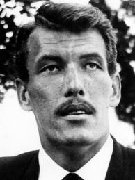
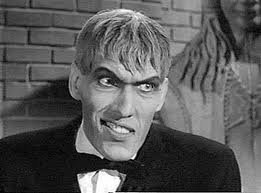
1939 – France Nuyen, French actress
1965 – J. K. Rowling, British writer






